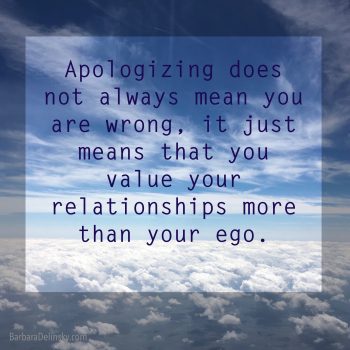The art of the apology

“I’m sorry,” she said in horror.
Embarrassed, she said, “I’m really sorry.”
“I am so, so sorry,” she said with heartfelt regret.
I write these words in my books all the time. In fact, I’m about to write a pivotal scene in Making Up in which apologies are key. It’s between mother and daughter, Margaret and Mackenzie, ages 60 and 38 respectively, and they’ve been estranged for nearly five years. Suddenly, now, again, they need each other in that deepest familial way. Apologies, truly, are their only path forward.
Do you apologize when you’ve done wrong? I do. I do it all the time. And it isn’t that I make more mistakes than other people, just that I believe apologizing when I’ve been wrong – or insensitive – or short-sighted, is the right thing to do. And it isn’t always easy. To offer an apology means admitting to making a mistake. It means taking responsibility for it. It often entails humbling oneself and then committing to change.
Apologizing can also mean that you’re sorry not for what you did, but for doing something that causes another person to be upset. This is one of the best ways to get things moving after butting heads on an issue.
Ideally, we’re taught to apologize when we’re kids. I remember standing my sons in front of me after they’d misbehaved and waiting for – insisting on – lecturing them about the importance of the apology.
Many see an apology as a sign of weakness. I do not. Sure, the person who apologizes over and over again for the same misdeed is being insincere. But the heart-felt apology is a sign of character. It’s about setting a good example, about being a strong role model. No one of us is right all the time. In today’s world, life unfolds at a breakneck pace. We think things fast, say things fast, spread things fast. Inevitably, mistakes happen, and we say or do something that we later realize is wrong – and if not wrong, then certainly hurtful.
The person who offers an apology when an apology can help is not only strong. He is confident. He is honest. He thinks beyond himself to the good of someone else.
So what about the person who won’t apologize – the one who is too arrogant or thin-skinned to admit he made a mistake? Does that person think he is simply above everyone else? Does he think social discourse can survive without honest give and take?
Our president doesn’t apologize. Is it a man thing? Or a Trump thing?
Whatever, Margaret and Mackenzie are about to do it, and I couldn’t be more proud.

If you’d like to read more of Barbara’s book reviews, sign up for her newsletter here. You can also find her on Instagram where she frequently shares photos of her photography, family, and travels.
Want an insider peek to all things writing? Join her street team!
It is better to apologize than to let anger take over! One doesn’t have to be weak-it is a sign of strength, good upbringing, honor… love this blog!!!
I agree with every word of this. A heartfelt apology is a sign of strength. It says, “I care about this relationship more than I care about being right.”
I also think it is important to accept heartfelt apologies, which can be as difficult as giving them.
But as you say, heartfelt is the key! Nothing is more unattractive than someone using apologies as a “get out of jail free” card for repeated bad behavior. And the “only sorry for being caught” apologies are worthless.
Not apologizing is NOT a man thing. I certainly is a Trump thing and is totally consistent with his entire ignorant and insensitive existence.